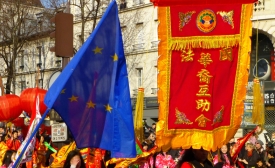soft power
President Uhuru Kenyatta has many women - in his Presidency. [...] Unlike his old man, President Uhuru has many women who, behind the scenes, are said to be the ‘soft power’ of his presidency. And more than ever before, these women hold crucial positions even as Uhuru bids for a second term in the do-or-die August 8 General Election.
President Emmanuel Macron’s mastery of public imagery, like that of Barack Obama, conceals a highly calculated, choreographed communications policy. [...] “For a president, everything is a story of symbols. He needs to have total control,” comments Albert-Alexis Galland, director of strategy with Kaolin.
The State Department and USAID are often conflated as parts of America’s “soft power” apparatus. And it’s true that in the broadest sense they seek to, as a joint mission statement puts it, “shape and sustain a peaceful, prosperous, just, and democratic world, and foster conditions for stability and progress for the benefit of the American people and people everywhere.” But beyond that they are dissimilar in every important way: The tasks they perform, what they value, their operating principles and how they carry out their work are profoundly different.
EXPO 2017 guests will have a unique opportunity to explore the ancient culture of nomadic civilisation, as Ethno Auyl (which stands for Ethno Village), an unusual cultural complex, has opened in the capital’s suburbs.
Manga and anime are a good source of soft power for Japan. If creators and animators can find a way to not just appeal to the elite readership in foreign countries but also to the masses – which would entail translating the manga into local languages and incorporating local stories – then manga and anime can be a veritable bridge between Japan and the rest of the world.

A new paper looks at the European Union's strategy in a multipolar world.
The mega-success in China of Amir Khan’s blockbuster, Dangal, has echoed strongly at the second BRICS festival, where filmmakers and actors brainstormed ways to collaborate in cinema to anchor the soft-power of the five nation grouping.
A week-long exhibition on China Intangible Culture kicked off here [Kathmandu] on Thursday, offering Nepalese an opportunity to gain an insight into the rich and abundant Chinese history and culture.







